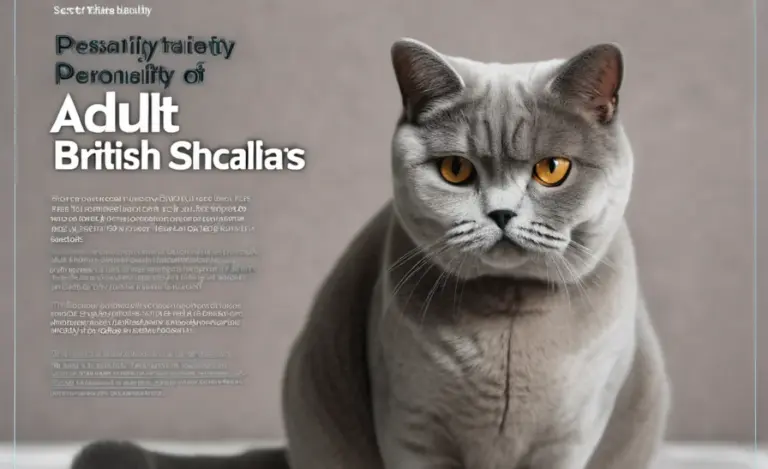British Shorthair Playful Yet Gentle Kittens: Ultimate Guide
Quick Summary: British Shorthair kittens are known for their playful yet gentle nature. They love to play with toys and explore, but they also enjoy cuddling and relaxing with their owners. This makes them wonderful companions for families and individuals alike. Early socialization and consistent training will help nurture their playful spirit while reinforcing their gentle temperament.
Bringing a British Shorthair kitten into your home is like welcoming a little cloud of fluff and affection. These kittens are famous for their round faces, plush coats, and, most importantly, their delightful personalities. You might be wondering how to best encourage their playful side while ensuring they grow into well-behaved, gentle cats. It’s a common concern, and with the right approach, you can easily balance their energy with their inherent sweetness. Let’s explore how to make the most of your British Shorthair kitten’s formative months!
Understanding the British Shorthair Temperament
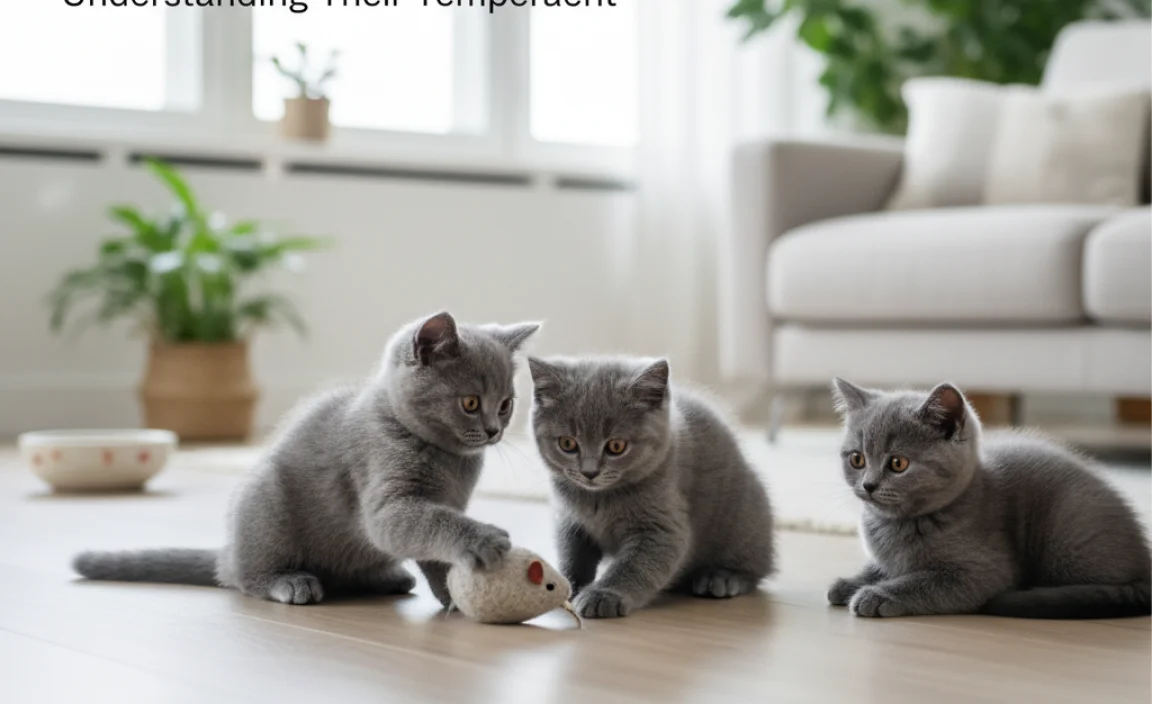
Before diving into specific tips, let’s understand what makes British Shorthairs so special. According to The International Cat Association (TICA), British Shorthairs are known for their calm and adaptable nature. This breed is typically independent but also enjoys human interaction, making them ideal companions. Their playful yet gentle demeanor is one of their most endearing traits.
Playful Characteristics
British Shorthair kittens are naturally curious and energetic. Their playfulness is characterized by:
- Interactive Play: They enjoy games like chasing toys, pouncing, and batting at dangling objects.
- Exploration: They love to explore their surroundings, often finding interesting nooks and crannies to investigate.
- Social Play: They often engage in playful interactions with other pets or family members.
Gentle Traits
While playful, British Shorthairs are also known for their gentle nature:
- Affectionate: They enjoy cuddling and being petted, often purring contentedly when receiving attention.
- Calm Demeanor: They are generally relaxed and not easily agitated, making them good companions for children.
- Patient: They tend to be patient and tolerant, especially when properly socialized from a young age.
Creating a Playful Environment
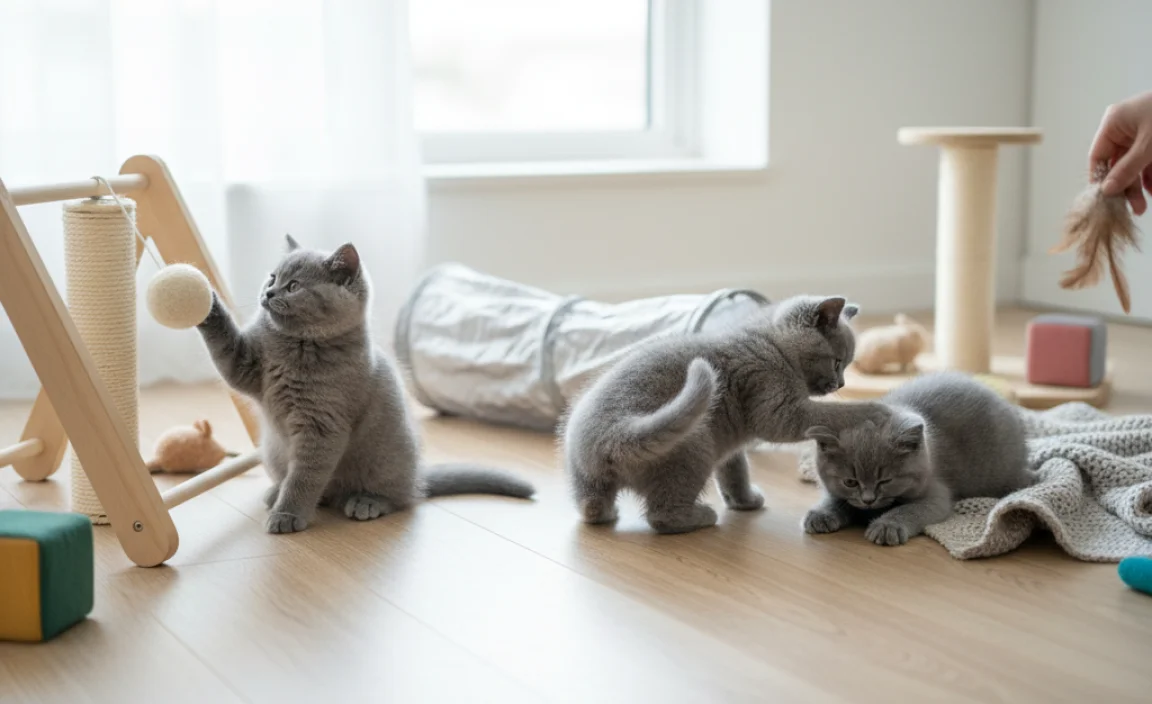
To nurture your British Shorthair kitten’s playful side, it’s essential to create an environment that encourages activity and exploration. Here’s how:
Provide a Variety of Toys
Kittens get bored easily, so having a diverse selection of toys is crucial. Consider the following:
- Interactive Toys: Feather wands, laser pointers (use with caution and never shine directly into the eyes), and puzzle toys.
- Chasing Toys: Small balls, toy mice, and crinkle balls.
- Scratching Posts: Essential for maintaining their claws and providing a place to stretch and play.
Create Climbing Opportunities
Cats love to climb, and British Shorthairs are no exception. Providing vertical spaces allows them to explore and satisfy their natural instincts. Options include:
- Cat Trees: Multi-tiered cat trees with scratching posts and hiding spots.
- Shelves: Install shelves at different heights to create a climbing wall.
- Window Perches: A comfortable spot for your kitten to watch the world outside.
Rotate Toys Regularly
To keep your kitten engaged, rotate their toys every few days. This makes old toys feel new again and prevents boredom.
Designate Play Areas
Create specific areas in your home where your kitten can play freely. This helps them understand where it’s okay to be active and explore.
Encouraging Playtime
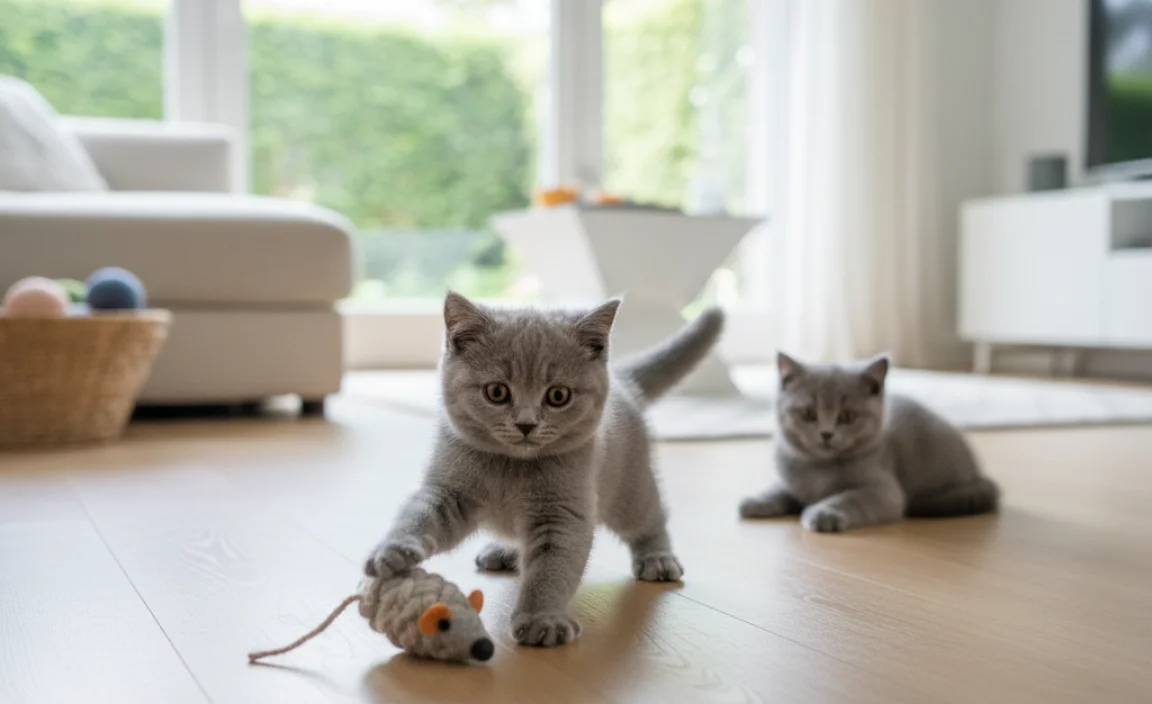
Now that you’ve created a playful environment, it’s time to actively engage with your kitten. Regular playtime is essential for their physical and mental well-being.
Schedule Daily Play Sessions
Aim for at least 15-20 minutes of interactive play each day. This can be divided into shorter sessions throughout the day to keep your kitten engaged without overwhelming them.
Use Interactive Toys
Interactive toys are great for stimulating your kitten’s natural hunting instincts. Feather wands and laser pointers (used responsibly) can provide hours of fun. Remember to let your kitten “catch” the toy at the end of the session to satisfy their hunting drive.
Engage in Chase Games
British Shorthairs love to chase, so toss a ball or toy mouse and let them stalk and pounce. This is a great way to encourage exercise and mental stimulation.
Play at Different Times of Day
Observe your kitten’s energy levels and adjust playtime accordingly. Some kittens are more active in the morning and evening, while others prefer to play throughout the day.
Reinforcing Gentle Behavior
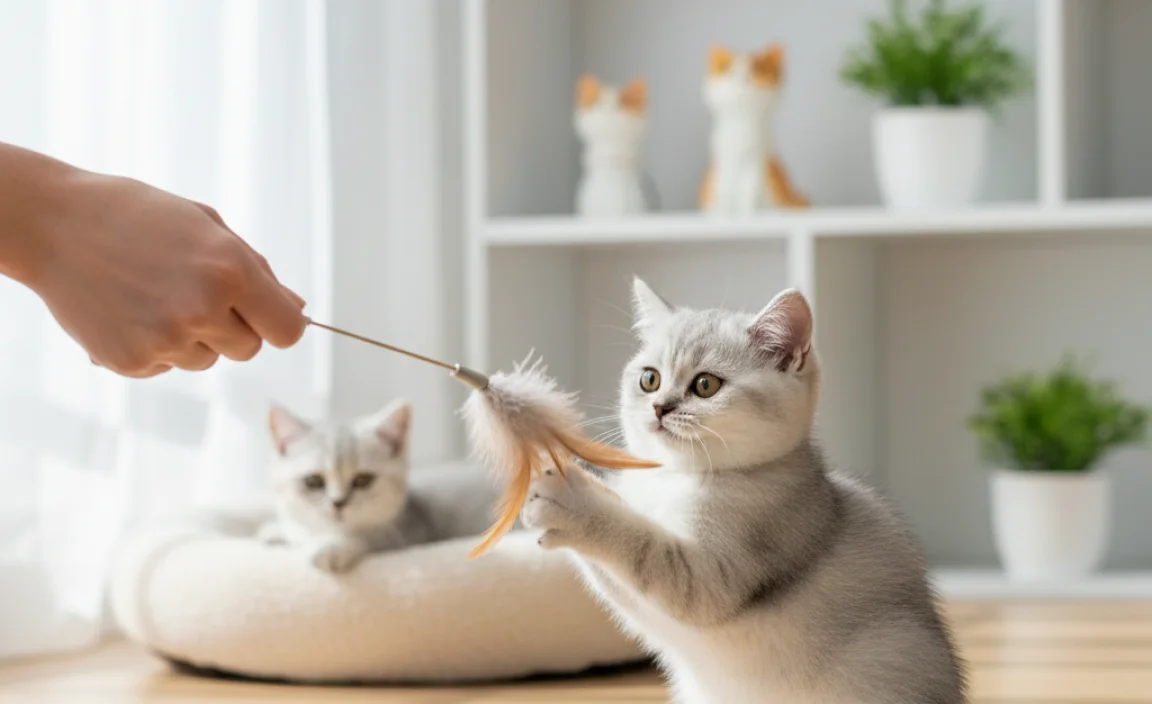
While encouraging playfulness, it’s equally important to reinforce gentle behavior. British Shorthairs are naturally gentle, but consistent training and positive reinforcement can help solidify this trait.
Use Positive Reinforcement
Positive reinforcement is the most effective way to train a kitten. Reward gentle behavior with praise, treats, or petting. For example, if your kitten approaches you calmly and rubs against your leg, offer a treat and gentle praise.
Avoid Punishment
Punishment can create fear and anxiety, which can lead to behavioral problems. Instead of punishing your kitten, redirect unwanted behaviors. For example, if your kitten is scratching furniture, gently move them to a scratching post and reward them when they scratch it.
Teach Bite Inhibition
Kittens often play by biting and scratching, but it’s important to teach them that this is not acceptable behavior with humans. If your kitten bites or scratches too hard during play, say “Ouch!” loudly and stop playing immediately. This teaches them that their actions have consequences.
Handle with Care
Always handle your kitten gently and respectfully. Support their body when picking them up, and avoid squeezing or holding them too tightly. This helps them feel safe and secure around you.
Socialization
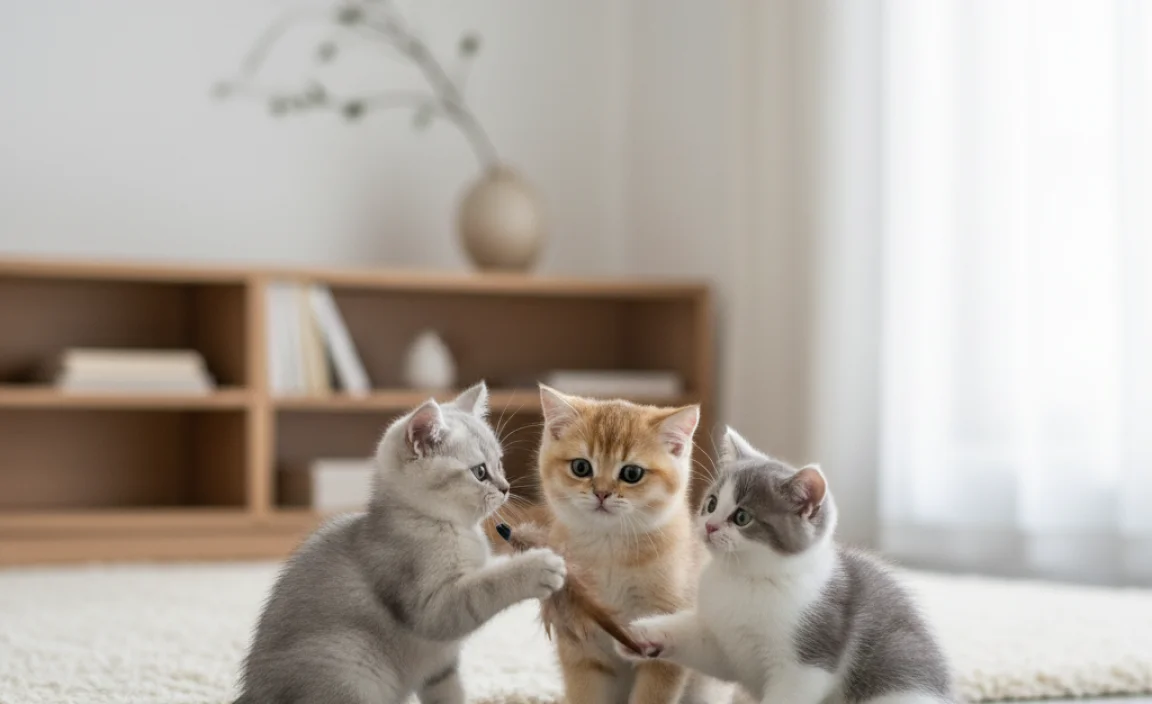
Early socialization is crucial for developing a well-adjusted and gentle British Shorthair. Exposing your kitten to a variety of people, animals, and environments can help them become more confident and adaptable.
Introduce to New People
Invite friends and family to meet your kitten. Encourage them to interact gently and offer treats. This helps your kitten associate new people with positive experiences.
Expose to Different Sounds and Sights
Gradually expose your kitten to different sounds and sights, such as vacuum cleaners, doorbells, and car rides. Start with short exposures and gradually increase the duration as your kitten becomes more comfortable.
Supervise Interactions with Other Pets
If you have other pets, introduce them to your kitten slowly and under supervision. Allow them to sniff each other through a closed door before allowing face-to-face interaction. Reward calm and gentle behavior with treats and praise.
Consider Kitten Classes
Enrolling in a kitten socialization class can provide valuable opportunities for your kitten to interact with other kittens and learn important social skills. The RSPCA offers resources and guidance on socializing kittens.
Nutrition and Health
Proper nutrition and health care are essential for your British Shorthair kitten’s overall well-being. A healthy kitten is more likely to be playful and gentle.
Feed a High-Quality Kitten Food
Choose a kitten food that is specifically formulated for kittens and contains high-quality ingredients. Look for a food that is rich in protein and essential nutrients to support healthy growth and development.
Provide Fresh Water
Always provide fresh, clean water for your kitten. Encourage them to drink by placing water bowls in multiple locations around your home.
Regular Veterinary Check-ups
Schedule regular veterinary check-ups to ensure your kitten is healthy and up-to-date on vaccinations and parasite prevention. Early detection and treatment of health problems can help prevent behavioral issues.
Maintain a Healthy Weight
British Shorthairs are prone to weight gain, so it’s important to maintain a healthy weight. Monitor your kitten’s food intake and adjust portions as needed. Encourage exercise through playtime and interactive toys.
Addressing Common Behavioral Issues
Even with the best care, kittens can sometimes exhibit unwanted behaviors. Here’s how to address some common issues:
Scratching Furniture
If your kitten is scratching furniture, provide plenty of scratching posts and encourage them to use them. You can also try applying double-sided tape to furniture to deter scratching.
Biting and Scratching During Play
If your kitten is biting or scratching too hard during play, say “Ouch!” and stop playing immediately. This teaches them that their actions have consequences.
Aggression Towards Other Pets
If your kitten is showing aggression towards other pets, separate them and reintroduce them slowly and under supervision. Consult with a veterinarian or animal behaviorist for further guidance.
Excessive Meowing
If your kitten is meowing excessively, try to determine the cause. They may be hungry, bored, or seeking attention. Provide food, water, playtime, and attention as needed.
British Shorthair Kitten Care Essentials
Caring for a British Shorthair kitten involves more than just playtime and training. Here’s a table summarizing essential care aspects:
| Care Aspect | Description | Frequency |
|---|---|---|
| Nutrition | High-quality kitten food, fresh water | Daily |
| Grooming | Brushing to prevent mats and hairballs | 2-3 times per week |
| Veterinary Check-ups | Vaccinations, parasite prevention, health screenings | As recommended by vet |
| Litter Box Maintenance | Clean litter box | Daily |
| Playtime | Interactive play sessions | 15-20 minutes daily |
| Socialization | Exposure to new people, animals, and environments | Regularly during kittenhood |
British Shorthair Kitten: Key Milestones
Here’s a quick rundown of what to expect as your British Shorthair kitten grows:
| Age | Milestone | What to Expect |
|---|---|---|
| 8-12 Weeks | Weaning and First Vaccinations | Transition to solid food; start of vaccination schedule. |
| 3-6 Months | Rapid Growth and Socialization | Increased activity, playfulness, and social interaction. |
| 6-12 Months | Adolescence | Increased independence, potential for behavioral changes. |
| 1-2 Years | Reaching Maturity | Full adult size and temperament established. |
Frequently Asked Questions
Here are some frequently asked questions about British Shorthair kittens:
Are British Shorthairs good with children?
Yes, British Shorthairs are generally good with children. They are known for their patient and tolerant nature. However, it’s important to teach children how to handle cats gently and respectfully.
How much exercise do British Shorthair kittens need?
British Shorthair kittens need about 15-20 minutes of interactive play each day. This can be divided into shorter sessions throughout the day.
Do British Shorthairs shed a lot?
Yes, British Shorthairs have a dense coat that sheds moderately. Regular brushing can help minimize shedding and prevent mats.
Are British Shorthairs prone to any health problems?
British Shorthairs are generally healthy, but they can be prone to certain health problems, such as hypertrophic cardiomyopathy (HCM) and polycystic kidney disease (PKD). Regular veterinary check-ups can help detect and manage these conditions.
How long do British Shorthairs live?
British Shorthairs typically live for 12-15 years, but some can live longer with proper care.
What is the best way to groom a British Shorthair kitten?
Regular brushing is key. Aim to brush your kitten 2-3 times a week to prevent mats and reduce shedding. A stainless steel comb and a soft bristle brush work well.
When should I start training my British Shorthair kitten?
Start training as soon as you bring your kitten home. Positive reinforcement techniques, such as rewarding good behavior with treats and praise, are very effective.
Conclusion
Raising a playful yet gentle British Shorthair kitten is a rewarding experience. By providing a stimulating environment, encouraging playtime, reinforcing gentle behavior, and ensuring proper nutrition and health care, you can help your kitten thrive. Remember, consistency and patience are key. With the right approach, you’ll have a well-adjusted, affectionate companion for many years to come. Enjoy the journey of watching your little fluffball grow into a magnificent, gentle cat!

